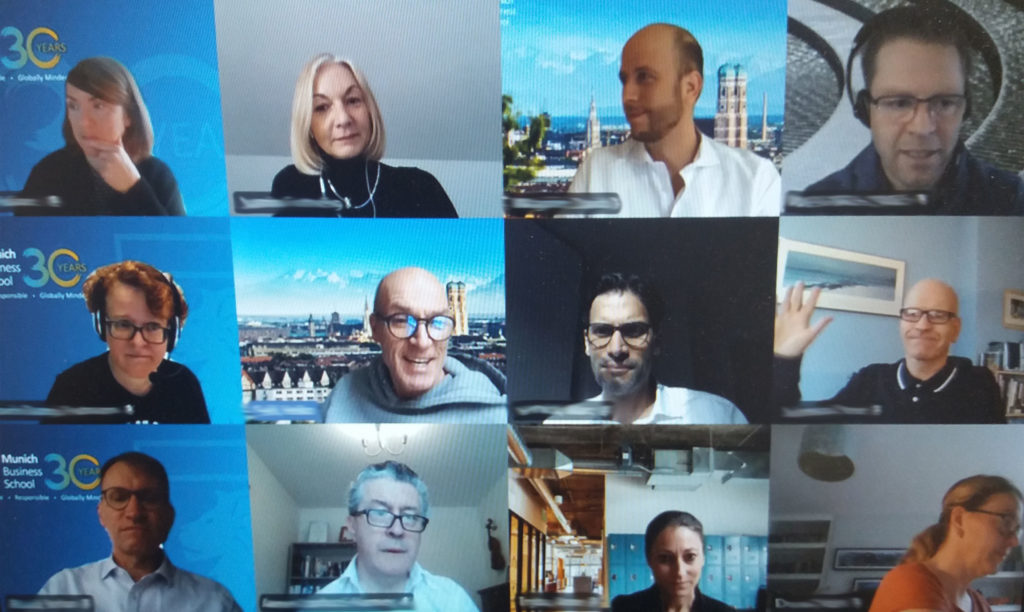
After the successful start last year, the second MBS Doctoral Conference again offered the opportunity to exchange on current research projects of the DBA candidates.
On May 21, 2021, a total of eleven DBA students and alumni presented their research projects at the second virtual MBS Doctoral Conference. Prof. Dr. Heiko Seif, Dean of Research and current Academic Director of the DBA program, welcomed contributors from all DBA cohorts to the event. For the first time, the event included representatives from DBA partner universities Sheffield Hallam University (SHU) and the Zagreb School of Economics and Management (ZSEM).
The team organizing the conference were also delighted to see the number of presentations double and the great response from those in attendance. Almost 70 academics, practicians and students from all subjects signed up for the conference, which ensured a lively discussion.
First of all, Professor Heiko Seif underlined the goal of the MBS Doctoral Conference: “An exchange of ideas about research projects is highly beneficial for all participants from around the world – and for the current DBA candidates in particular. They will gain fresh impetus, answers to their questions, and valuable feedback for further development of their research project.”
DBA students from MBS, SHU and ZSEM give insights into their research projects at the second MBS Doctoral Conference
To begin with, two DBA students from MBS presented their current thesis projects. In James Westgarth’s presentation, entitled Heuristics and biases: A predictive framework for business travel managers, he explored the decision behavior of business travelers from the perspective of behavioral economics. Jasmin Gottselig then presented her project, Managing digital transformation through organizational transformation – A case within the automotive industry. This is an exploratory case study aiming to better understand the dynamics of the digital transformation in the industry.
Then, in a section entitled Research in its early stages, three students in the first year of their DBA presented the initial developments in their research projects.
James Landucci-Harmey (SHU) focuses on risk management in his research. In his presentation, Using the value chain in international risk frameworks for service sector companies, he examined how we might develop the concept of the value chain first described by Michael Porter in 1985.
Stefan Schnichels (MBS), on the other hand, has decided to concentrate on changes in the German insurance industry. In his presentation, Customer-agent relationship in the German insurance industry within augmenting digitization of its society, he outlined how and why he had chosen this topic for his research.
Srdjan Sverko (ZSEM) is examining a very different topic in his research project. Under the title Management of corporate social responsibility in the banking sector, he is exploring the spread of CSR among employees and how it generates value for companies.
These speeches were rounded off by DBA alumnus Dr. Alexander Müller, who left an impression on the audience with his thesis, Using the value chain in international risk frameworks for service sector companies. His brilliant investigation into image theory examined the compatibility test and the screening process used in image theory to form decision selection sets.
Keynote: The Defense of a Doctoral Thesis by DBA alumnus Dr. Ralf Kaltenbach
One of the day’s particular highlights was the keynote speech by Dr. Ralf Kaltenbach, who was awarded his doctorate in the summer of 2020 for his thesis, Transformation of German IT Infrastructure Sales Ecosystems during the Course of Digitalisation.
Dr. Kaltenbach, an alumnus of the first cohort of DBA students at MBS, not only gave an insight into his research but also sought to provide current DBA students with tips for preparing, delivering and following up on the oral defense of their thesis. He listed his top five recommendations for each of these three phases. In addition to self-organization (such as trying out your defense in a mock viva with your supervisor, taking a copy of your thesis with you and clearly marking key sections, and considering possible questions and answers), Dr. Kaltenbach’s recommendations also focused on the students’ fears (such as handling well-intentioned but confusing advice, seeing the viva as an opportunity, discussing your topic intensively with the viva committee, relaxing, looking forward to integrating feedback, and then finally being able to let go) – and much more besides.
The following Q&A section chaired by Prof. Dr. David Wagner gave the doctoral students in the audience the opportunity to gather further useful tips from Dr. Kaltenbach and the professors from Sheffield Hallam.

Following a lunch break, the more advanced DBA students then presented their research projects. First, Marko Peric from ZSEM introduced the conference to the private equity industry. In his study, Value creation from the data modelling in the private equity industry, he presented his concept for using knowledge from databases and software tools, which can help to understand material and immaterial value in the private equity industry. The doctoral students from Munich Business School focused on very different topics. In Markus Holzberger’s presentation, Corporate agility: A framework how to successfully navigate in turbulent environments, he outlined the various dimensions to agility in the corporate context. Or Sela gave a presentation entitled Examining athletes’ leadership skills development and transfer from sport into business, which explored how skills honed during a professional sports career could translate into the corporate world. Alexander Martin then gave the final presentation, entitled Striking the right balance – Maximising B2B relationship value using service digitalization. His research project aims to demystify the digitalization of services in B2B relationship management. Like his peers, Martin used the conference to pose questions to the academics in the audience with the aim of using their feedback to further his research.
The second MBS Doctoral Conference was thoroughly successful, both for the junior researchers and for the leaders of the DBA program. Its success can be attributed to the numerous absorbing presentations, the opportunity to make new contacts, the fresh ideas for future collaboration, and the dialog between the doctoral candidates and supervisors from all partner universities.
Prof. Dr. David Wagner, who will become Academic Director of the DBA program at MBS from the fall of 2021, delivered a positive summary at the end of the conference. “We’ve enjoyed a day full of fascinating talks and I’m sure that we will all take some inspiration away with us. We’re already looking forward to the next edition in 2022, which will hopefully be able to take place at least partially in person at MBS!”

Would you like to scientifically research a current economic issue within the framework of a doctorate without having to leave your professional career?
The part-time Doctor of Business Administration (DBA) program at Munich Business School and Sheffield Hallam University (SHU) is just right for you! See for yourself: Doctor of Business Administration



